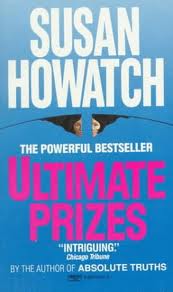 Ultimate Prizes
Ultimate Prizes
By Susan Howatch
Rating: 5 of 10
I’m afraid that Susan Howatch’s ultimate prize is accurate knowledge about one’s past. Meanwhile, this Church of England series is getting to be a little formulaic. The formula goes something like this:
Anglican clergy + life crisis + big sexual sin + denial of sin + emotional breakdown + spiritual director + confession/psychoanalysis of one’s past family history (especially the skeletons in the closet) = happy, healthy, and effective Anglican clergy.
This is the third in the Church of England series. The first two, Glittering Images and Glamorous Powers, were gripping, and I couldn’t put them down. This one sat unread for several weeks at a time. I found the characters less compelling and the formula just a little too heavy handed.
Ultimate Prizes tells the story of Archdeacon Neville Aysgarth’s search for the ultimate prizes of life: climbing the ecclesial ladder, marrying the right woman, having the right children, and so on. The only problem is that once Aysgarth has won the prize, he seems to no longer really value it. Thus, when his first “perfect” wife dies, he courts and marries an eccentric socialite only to end up having an affair while she is recovering in the hospital from a disastrous labor where the child was killed in order to save the mother. This behavior along with his increasing habit of turning to alcohol leads him to seek help from the spiritual director, Jonathan Darrow, who is the spiritual director in the first book in the series, Glittering Images, and the subject of the second book, Glamorous Powers, and who Aysgarth has had run-ins with as Darrow’s church superior. The plot thickens.
Darrow, along with some help from his other Fordite Monk friends, help get Aysgarth back on the straight and narrow. They do so by exploring his past. What we come to find out is that Aysgarth has had an extremely rocky relationship with his mother, father, and uncle. Over time his denial has grown about what exactly happened between these three key figures in his upbringing. Darrow helps Aysgarth explore the landscape of his childhood and young adulthood so that he can give up chasing the ultimate prizes and instead have healthy relationships with less-than-perfect people.
At the very beginning of the book Aysgarth says, “I did not understand why I had wound up in such a mess, and without understanding, how could I promise that my appalling behavior would never be repeated.” At the end of the book after Aysgarth has “confessed” the truth about his past without denial of the skeletons in the closet, Darrow exclaims, “You’ve grasped the truth. You’ve demonstrated with every syllable you utter that you repent. Can’t you see your demon’s vanquished, cowering with terror in his pit?” Notice the lowercase “t” for truth.
Here’s the problem: understanding and knowledge alone can’t save us. Yes, they can help us grow in maturity, but it was knowledge that got humanity in the pit in the first place. It’s not knowledge alone that will get us out of it. Rather it is only when we grasp firmly on to the Truth, capital “T”, of Jesus Christ that we will be saved. I do not necessarily think that truth and Truth are incompatible. It is more a question of priority. Howatch’s books major in truth rather than Truth. This kind of truth can only be helpful when it is in service of Truth.
There was one particularly poignant moment that I found especially compelling. When Asygarth is meeting Darrow’s old Abbot-General, Father Lucas, for spiritual direction, Lucas says, “I presume that most of your private prayers are ex tempore? Well, there’s nothing wrong with ex tempore prayers, of course, but at present you want to be very careful that your prayers aren’t merely a flurry of words which will mar the inner stillness you must cultivate in order not only to maintain your equilibrium but to receive the word from God which will undoubtedly come.” “Ex tempore” is Latin for “out of the moment,” and ex tempore prayers are spontaneous prayers. Lucas goes on to suggest mixing in some written prayers from the Daily Office, the set pattern of prayers prayed several times a day. I have found this suggestion exceedingly helpful in my own spiritual journey. I grew up Pentecostal where written prayers were frowned upon. Over time I have come to appreciate both types of prayer. I think a mix of both would help most Christians grow in the spiritual maturity.
I would likely give up on this series at this point if it wasn’t for one interesting twist Howatch makes in the next book. She picks up the story from the perspective of someone outside the church. I am intrigued to see what she will do with this outsider’s perspective. I hope there will be a new formula for this outsider’s spiritual journey.
Currently Reading/Listening:
Generation to Generation by Edwin H. Friedman
Sacred Parenting by Gary Thomas
Scandalous Risks by Susan Howatch
Lamb: The Gospel According to Biff, Jesus’ Childhood Pal by Christopher Moore
The Good Man Jesus and the Scoundrel Christ by Phillip Pullman

Speak Your Mind
You must be logged in to post a comment.